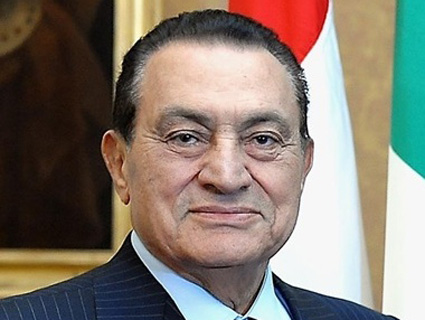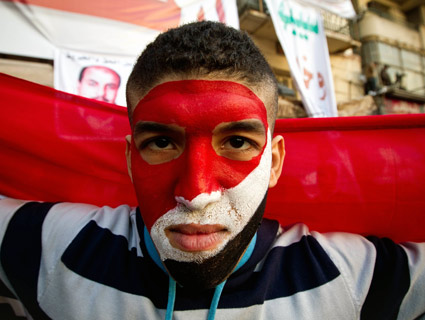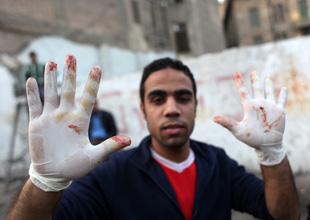
<a href="http://en.wikipedia.org/wiki/File:Hosni_Mubarak_ritratto.jpg">Wikimedia</a>
Editor’s note, 6/19/12: Hosni Mubarak, sentenced to life in prison this month and in deteriorating health, was reportedly put on life support in an Egyptian military hospital on Tuesday. (Reuters initially reported that Mubarak been declared “clinically dead” by Egyptian authorities.) Below is an overview of his brutal legacy, as Egyptians ousted him from power in spring 2011.
Cario has been ablaze for the past week. As the Egyptian people have faced expired tear gas (from cans stamped “Made in America”), army tanks, water hoses, bullets, and imprisonment, it is important to know just how bad this United States-supported dictator is. Below, some examples of Egyptian President Hosni Mubarak’s misdeeds which illustrate nicely why so many Egyptians want him out for good.
Torture
Mubarak is most well-known among human rights advocates as a serious offender of the International Covenant on Civil and Political Rights, the Convention against Torture [PDF], and Egypt’s own constitution. The offenses are innumerable:
- The Egyptian Organization of Human Rights reports that between 1993 and December 2008, 460 torture cases were reported, with 167 cases of death due to torture or ill-treatment.
- The families of suspects are often tortured to extract information about suspects. One account from 2008 reports that after police officers burst into the home of an absent suspect, they attacked his pregnant sister instead—with a baseball bat. She fell over a flight of stairs and died.
- Mubarak has a long and comfortable relationship with hosting and torturing detainees for the United States and the U.K., an arrangement often overseen by Mubarak’s newly-appointed Vice President Omar Suleimen.
Freedom of Speech
- Since the protests, Mubarak has blocked the internet, SMS and Twitter, cut off activists’ cell phone service, imprisoned journalists, shut down Al Jazeera‘s Cairo headquarters, and seized six reporters and their station’s equipment.
- Last year, Egypt was listed as number 127 by Reporters Without Borders’ Press Freedom Index. Reporter harassment is one reason for the low ranking. Case-in-point: a publisher was kidnapped last April for producing a book about Mohammed ElBaradei, the Nobel Peace Prize Laureate who recently returned to Egypt as a leading voice in the opposition movement. Last year, another member of the press was arrested and slapped with drug charges that reduced his rights under Mubarak’s 30-year-old State of Emergency after he reported on forced evictions in Alexandria.
- Mubarak also took precautions against any negative media coverage of last year’s parliamentary elections, by creating tough restrictions, difficult permit processes and fees on television stations, along with harrassing journalists whose coverage was unflattering.
Police Violence
- Videos from recent events show brutal clashes with protesters.
- Last June, Amnesty International reported 28-year-old Khaled Mohammed Said was beaten to death by police. The police covered it up by filing a report that he had overdosed on drugs. The [graphic] photo obtained by Amnesty begs to differ.
- Police brutality worsened during last year’s elections. Plainclothes officers often allowed, or even encouraged, thugs to beat and rape protesters and journalists, according to Human Rights Watch. Security barred access to polling sites and voter intimidation was rampant.
Homelessness
- In 2003, Egypt conducted a mass arrest of street children who were then beaten and sexually abused by police officers and older prisoners. They were often denied food, bedding, and medical care. These children had committed no crime, but were considered “vulnerable to delinquency” according to Egypt’s Child Law.
- Cairo and Giza’s shack dwellers live under the threat of evacuation [PDF], due to government’s efforts to clean up the urban image.
Perpetual “State of Emergency“
- Last May, the Egyptian Parliament voted to extend it’s 30-year-old State of Emergency law for two more years. The law allows the government to imprison anyone indefinitely if they are considered a threat to national security.
- Under State of Emergency law, the government can (and has) set a curfew, restrict movement and gatherings, shut down publications, conduct unwarranted searches, shut down stores, seize companies, take away weapons, and evacuate areas.
- The law also gives the government special power to break up any protest. And often, a peaceful protest results in severe acts of violence by the police against the civilians.
Gay Rights
- Homosexuality is so taboo that Egyptian human rights groups won’t even defend them. It is not illegal on the books, but often punished under false charges, such as “debauchery”.
- Gay men are regularly forced to take HIV tests and anal examinations.
- A 2004 report by Human Rights Watch published complaints from Egyptian men of having been harassed, burnt with cigarettes, and hung in painful suspension positions while in jail. Authorities often use electroshock on genitals and tongues and encourage other prisoners to rape men accused of homosexuality.
Refugees
- According to the U.S. Committee of Refugees and Immigrants, Egypt hosted over 150,000 refugees in 2009.
- In 2008, some 30 Africans were killed by Egyptian border police, as they tried to cross the Israeli border.
- Life is so uncomfortable for refugees in Egypt, that they haven’t even bothered protesting over the past week. We interviewed a couple of Sudanese refugees living in Egypt, which you can read about here.
















